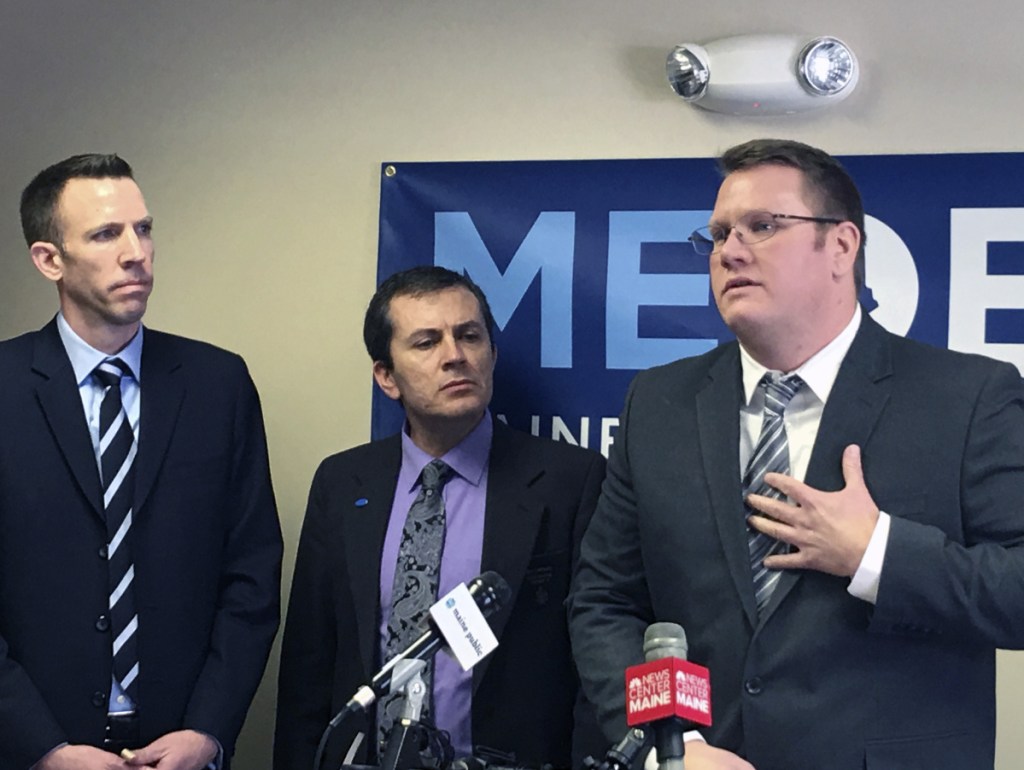AUGUSTA — Andrew Kiezulas doesn’t know whether having the opioid overdose antidote naloxone on hand would have made a difference when he found his roommate unresponsive five years ago – at the time there would have been no way for Kiezulas to legally possess the lifesaving drug.
But Kiezulas, himself in long-term recovery from substance use disorder, urged Gov. Paul LePage on Thursday to approve rules sent to his office five months ago for making the antidote available without a prescription to families and friends of Mainers addicted to opioids – who are dying of overdoses at the rate of one a day.
“This person had almost six months of sobriety,” Kiezulas said of his roommate, who died from the overdose. “And finding him was a horribly tragic experience that I hope that no one ever has to go through. More importantly at that time, I was literally not legally able to have naloxone that could have possibly saved his life.”
The Maine Board of Pharmacy approved rules last August to guide pharmacists in dispensing the antidote, often sold under the trade name Narcan. The board sent the rules to LePage for review, but the governor has taken no action and told a reporter last week he knew nothing about the subject.
It’s not known how many lives might have been saved if naloxone was widely available, but Maine emergency workers used it to revive patients 2,380 times in 2016 and 1,585 times in 2015, according to state figures. Data for naloxone use in 2017 has not been released yet.
Joining Kiezulas and others at a news conference organized by the Maine Democratic Party was state Rep. Jay McCreight, D-Harpswell, the House chair of a special task force on Maine’s opioid crisis. The task force recently issued a report calling for significant new efforts to prevent and treat opioid addiction, which claimed 376 lives in 2016.
McCreight and state Sen. Ben Chipman, D-Portland, also urged LePage to send the rule to the public and, more importantly, to pharmacists, some of whom have said they won’t follow the law until the rules are in place.
LePage and members of the pharmacy board, including its president, Joe Bruno, have refused to explain why they are not publishing the new rules. LePage’s office did not respond to requests for comment Thursday.
When asked by a Press Herald reporter about the rule last week, LePage said only, “I don’t know a thing about it.” LePage’s press secretary said last week that the rule is “pending” in the governor’s office. Bruno has refused to comment.
Bruno maintains that the rule cannot be published until LePage signs off on it, but Maine Attorney General Janet Mills, a Democrat, has said there is no legal requirement for LePage to approve the rule.
“This epidemic crosses all demographics,” McCreight said. “It affects all age groups, all income groups, those living in rural and urban areas. It does not discriminate and not one of us is left untouched.
“It’s a disease that requires treatment,” she continued. “We need to increase access to this treatment, but we must make sure that people stay alive to receive that treatment and all lives are valuable. To put it bluntly, if someone dies of an overdose they can’t receive treatment.”
Chipman, who noted that the opioid crisis has now claimed more American lives than the Vietnam War, took even sharper aim at LePage.
“At this point we have an opportunity to save lives, and it is really unfortunate that the governor is playing the role of God in determining whose life should be saved and whose shouldn’t be saved,” Chipman said. “If somebody’s having an overdose – whether it is the first time, the sixth time or the 10th time – we have a moral obligation to save their life.”
Since entering recovery, Kiezulas has completed his chemistry degree at the University of Southern Maine with concentrations in mathematics and leadership and organizational studies. He’s now a graduate student at USM’s Muskie School of Public Service.
“I have a job, I pay taxes, I volunteer in the community,” Kiezulas said. “This is one of so many incredible stories of the power and possibility that rest within recovery.”
Scott Thistle can be contacted at 713-6720 or at:
sthistle@pressherald.com
Twitter: thisdog
Send questions/comments to the editors.




Comments are no longer available on this story